#world science fiction convention
Photo








cyberpunk daomadan刀马旦 of chuanju川剧 (sichuan opera) at World Science Fiction Convention 2023 by 雁鸿Aimee
#china#fun#WSFC#world science fiction convention#photography#cyberpunk#op named her work as 川剧机械梦幻少女#daomadan#chuanju
4K notes
·
View notes
Photo
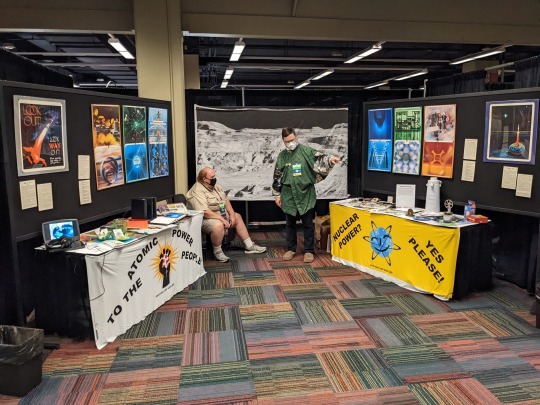
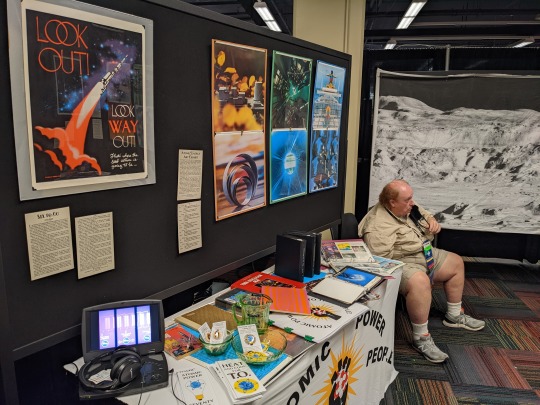
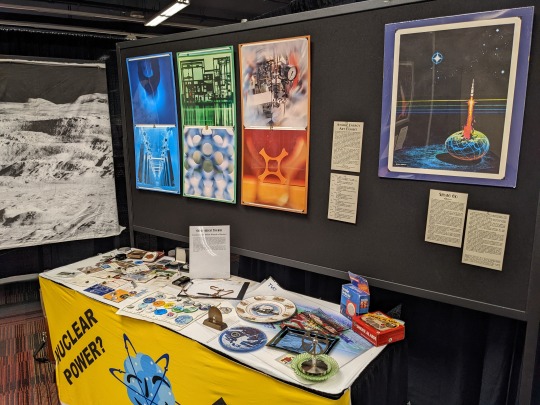
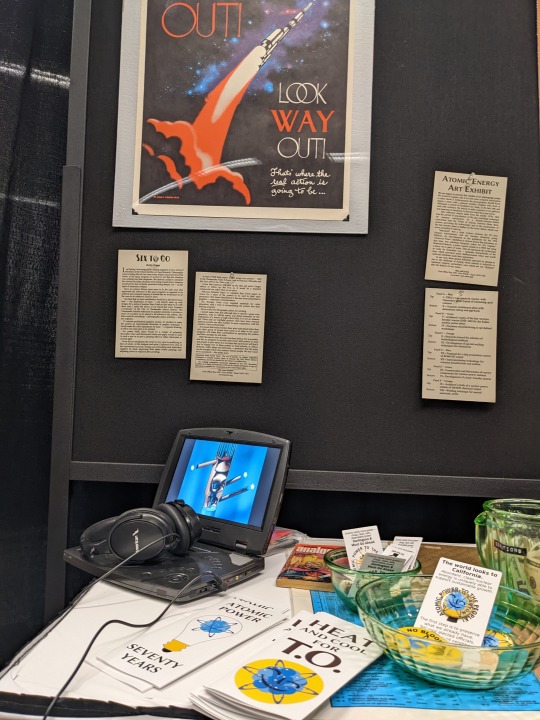
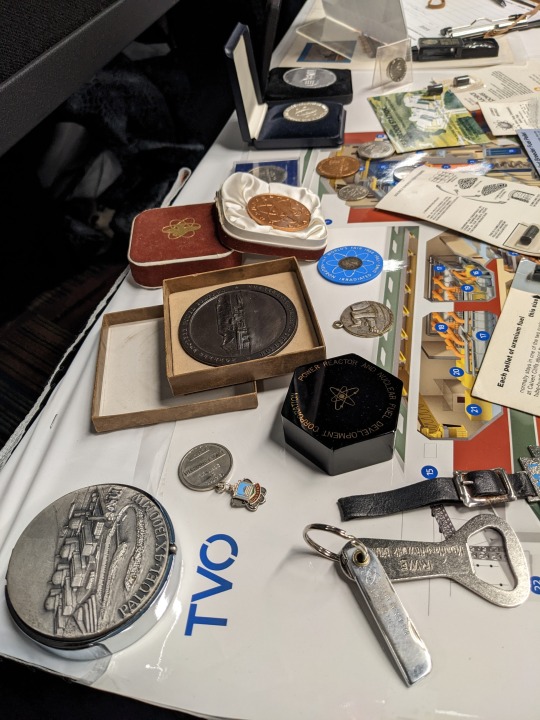




The Man and Atom Society display at the 80th World Science Fiction Convention, Chicon 8. Yours truly in green. Also pictured : engineer Ed Wilson, of Winnipeg. Photos by Lars Clausen.
In addition to thanking the Worldcon organizers for giving us the space, we would like to acknowledge the financial support from Generation Atomic, as well as several generous individuals, which helped make this exhibit as good as it was.
#world science fiction convention#worldcon#displays#public information materials#atomic power to the people#The Stars Are Ours#nuclear memorabilia#artwork
40 notes
·
View notes
Text
So, this weekend is Chicon! aka the World Science Fiction Convention in Chicago! So I'm going to be very, very gone most of this weekend.
Due to working in education, I can't take two days off in a row so tomorrow is going to be my first day... post The Eclipse and subsequent screaming, of course.
There might be pictures, we'll see!
Anyway, the con goes through Monday so I'm likely to be fairly missing outside mornings for this weekend. I'm gonna do my best to keep up with BL because I don't cope well with catching up (lol) but asks will be left waiting.
Anyway! I'm excited but also a four day convention is going to be exhausting, dear lord. It's all fun and games but I'm also an introvert's introvert and I'm very grateful to be commuter conning this one so I get to sleep in my own bed and watch BL in between long days off socializing.
I have to decide a day to wear my BL cosplay. Probably Sunday.
22 notes
·
View notes
Text
IT'S OFFICIAL: I'M A PROGRAM PARTICIPANT AT CHICON 8
IT’S OFFICIAL: I’M A PROGRAM PARTICIPANT AT CHICON 8
I’m thrilled to announce that I will be a program participant at Chicon 8
The 80th World Science Fiction Convention
September 1 – 5, 2022
Hyatt Regency Chicago
151 E Wacker Drive
Chicago, Illinois 60601
Stay tuned for more information
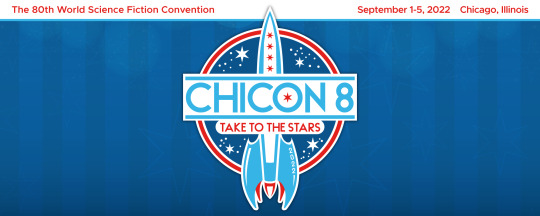
View On WordPress
#A. L. Kaplan#Author Appearance#Chicago#Chicon 8#program participant#World Science Fiction Convention#WorldCon
4 notes
·
View notes
Text
Seatle Wins Worldcon Bid for 2025
This may not be the most stunning piece of news, considering it was the only bid at Chengdu Worldcon, but it is is now official.
The winning bid — the only one for 2025 — was submitted by a group of fans who plan to place the Worldcon at the new Summit expansion to the Seattle Convention Center. They were confirmed at the Worldcon site selection event in Chengdu, China.
The theme is “Building…
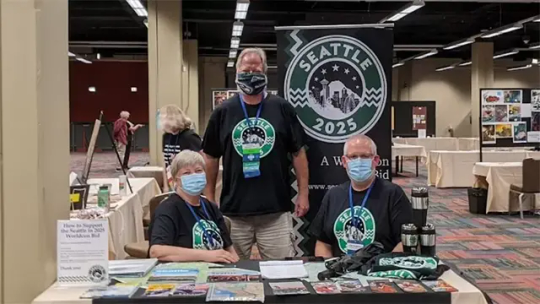
View On WordPress
1 note
·
View note
Text
How does one examine the use of language and style in a science fiction or fantasy work?
Science fiction and fantasy literature often feature imaginative and otherworldly settings, characters, and themes, which can make the genre challenging to write and read. The use of language and style in these works plays an essential role in bringing the fictional world and its characters to life. Examining the use of language and style in science fiction and fantasy works can help readers…

View On WordPress
#audience#characterization#fantasy#figurative language#genre conventions#language#literary analysis#Literary devices#narrative techniques#Pacing#science fiction#style#Symbolism#World-building#writing style
0 notes
Note
Hi Neil,
Sorry if this is trivial but I'm a bit confused re: the Hugo Award. Isn't it an American award? What does it have to do with Chinese censorship?
Thanks!
The Hugo Award isn't an American Award. It's an award given by (and at) the World Science Fiction Convention, which moves around. In 2023 the Worldcon was in Chengdu, China.
In previous years the Hugo process has been commendably transparent.
This year a number of books, people, and things that people nominated, in order that they be on the voting ballot, were declared "ineligible" and did not appear on the voting ballot.
No explanation has been given for why this was or why any of the individual works were ineligible. No explanation has been given for why no explanation can be given, other than "after we reviewed the constitution and the rules we must follow, we determined the work was not eligible," with no explanation of what the "rules they must follow" are.
There is a not-unwarranted suspicion here that it has to do with Chinese censorship. Other explanations would happily be entertained but the complete lack of information is difficult to deal with.
4K notes
·
View notes
Text
How To Judge a Book By Its Cover
How To Judge a Book By Its Cover
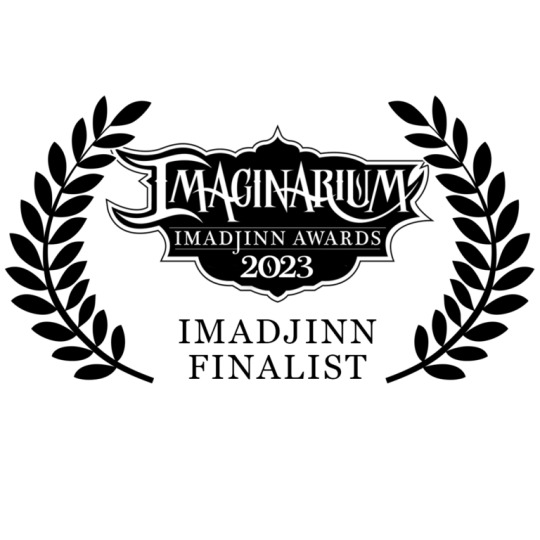
View On WordPress
#Chris Durston#convention#epic fantasy#fantasy#imadjinn awards#imaginarium#it came from the trailer park#john m olsen#joint task force 13#jtf-13#Michael K. Falciani#military scifi#paranormal city#sci fi#science fiction#scienceficiton#scifi#stephen oliver#the raven and the crow#the world of guilt#urban fantasy#william joseph roberts
1 note
·
View note
Text
The majority of censorship is self-censorship
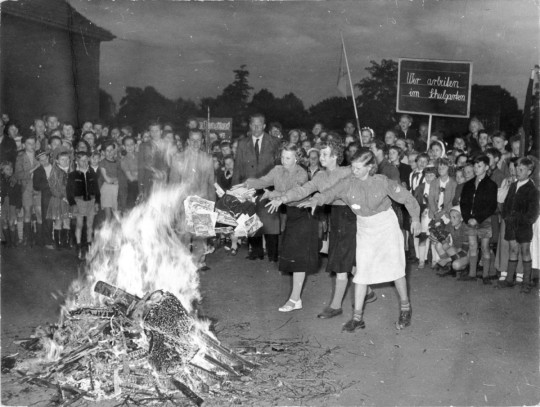
I'm on tour with my new novel The Bezzle! Catch me TONIGHT in SAN DIEGO (Feb 22, Mysterious Galaxy). After that, it's LA (Saturday night, with Adam Conover), Seattle (Monday, with Neal Stephenson), then Portland, Phoenix and more!

I know a lot of polymaths, but Ada Palmer takes the cake: brilliant science fiction writer, brilliant historian, brilliant librettist, brilliant singer, and then some:
https://pluralistic.net/2022/02/10/monopoly-begets-monopoly/#terra-ignota
Palmer is a friend and a colleague. In 2018, she, Adrian Johns and I collaborated on "Censorship, Information Control, & Information Revolutions from Printing Press to Internet," a series of grad seminars at the U Chicago History department (where Ada is a tenured prof, specializing in the Inquisition and Renaissance forbidden knowledge):
https://ifk.uchicago.edu/research/faculty-fellow-projects/censorship-information-control-information-revolutions-from-printing-press/
The project had its origins in a party game that Ada and I used to play at SF conventions: Ada would describe a way that the Inquisitions' censors attacked the printing press, and I'd find an extremely parallel maneuver from governments, the entertainment industry or other entities from the much more recent history of internet censorship battles.
With the seminars, we took it to the next level. Each 3h long session featured a roster of speakers from many disciplines, explaining everything from how encryption works to how white nationalists who were radicalized in Vietnam formed an armored-car robbery gang to finance modems and Apple ][+s to link up neo-Nazis across the USA.
We borrowed the structure of these sessions from science fiction conventions, home to a very specific kind of panel that doesn't always work, but when it does, it's fantastic. It was a natural choice: after all, Ada and I know each other through science fiction.
Even if you're not an sf person, you've probably heard of the Hugo Awards, the most prestigious awards in the field, voted on each year by attendees of the annual World Science Fiction Convention (Worldcon). And even if you're not an sf fan, you might have heard about a scandal involving the Hugo Awards, which were held last year in China, a first:
https://www.nbcnews.com/news/world/science-fiction-authors-excluded-hugo-awards-china-rcna139134
A little background: each year's Worldcon is run by a committee of volunteers. These volunteers put together bids to host the Worldcon, and canvass Worldcon attendees to vote in favor of their bid. For many years, a group of Chinese fans attempted to field a successful bid to host a Worldcon, and, eventually, they won.
At the time, there were many concerns: about traveling to a country with a poor human rights record and a reputation for censorship, and about the logistics of customary Worldcon attendees getting visas. During this debate, many international fans pointed to the poor human rights record in the USA (which has hosted the vast majority of Worldcons since their inception), and the absolute ghastly rigmarole the US government subjects many foreign visitors to when they seek visas to come to the US for conventions.
Whatever side of this debate you came down on, it couldn't be denied that the Chinese Worldcon rang a lot of alarm-bells. Communications were spotty, and then the con was unceremoniously rescheduled for months after the original scheduled date, without any good explanation. Rumors swirled of Chinese petty officials muscling their way into the con's administration.
But the real alarm bells started clanging after the Hugo Award ceremony. Normally, after the Hugos are given out, attendees are given paper handouts tallying the nominations and votes, and those numbers are also simultaneously published online. Technically, the Hugo committee has a grace period of some weeks before this data must be published, but at every Worldcon I've attended over the past 30+ years, I left the Hugos with a data-sheet in my hand.
Then, in early December, at the very last moment, the Hugo committee released its data – and all hell broke loose. Numerous, acclaimed works had been unilaterally "disqualified" from the ballot. Many of these were written by writers from the Chinese diaspora, but some works – like an episode of Neil Gaiman's Sandman – were seemingly unconnected to any national considerations.
Readers and writers erupted in outrage, demanding to know what had happened. The Hugo administrators – Americans and Canadians who'd volunteered in those roles for many years and were widely viewed as being members in good standing of the community – were either silent or responded with rude and insulting remarks. One thing they didn't do was explain themselves.
The absence of facts left a void that rumors and speculation rushed in to fill. Stories of Chinese official censorship swirled online, and along with them, a kind of I-told-you-so: China should never have been home to a Worldcon, the country's authoritarian national politics are fundamentally incompatible with a literary festival.
As the outrage mounted and the scandal breached from the confines of science fiction fans and writers to the wider world, more details kept emerging. A damning set of internal leaks revealed that it was those long-serving American and Canadian volunteers who decided to censor the ballot. They did so out of a vague sense that the Chinese state would visit some unspecified sanction on the con if politically unpalatable works appeared on the Hugo ballot. Incredibly, they even compiled clumsy dossiers on nominees, disqualifying one nominee out of a mistaken belief that he had once visited Tibet (it was actually Nepal).
There's no evidence that the Chinese state asked these people to do this. Likewise, it wasn't pressure from the Chinese state that caused them to throw out hundreds of ballots cast by Chinese fans, whom they believed were voting for a "slate" of works (it's not clear if this is the case, but slate voting is permitted under Hugo rules).
All this has raised many questions about the future of the Hugo Awards, and the status of the awards that were given in China. There's widespread concern that Chinese fans involved with the con may face state retaliation due to the negative press that these shenanigans stirred up.
But there's also a lot of questions about censorship, and the nature of both state and private censorship, and the relationship between the two. These are questions that Ada is extremely well-poised to answer; indeed, they're the subject of her book-in-progress, entitled Why We Censor: from the Inquisition to the Internet.
In a magisterial essay for Reactor, Palmer stakes out her central thesis: "The majority of censorship is self-censorship, but the majority of self-censorship is intentionally cultivated by an outside power":
https://reactormag.com/tools-for-thinking-about-censorship/
States – even very powerful states – that wish to censor lack the resources to accomplish totalizing censorship of the sort depicted in Nineteen Eighty-Four. They can't go from house to house, searching every nook and cranny for copies of forbidden literature. The only way to kill an idea is to stop people from expressing it in the first place. Convincing people to censor themselves is, "dollar for dollar and man-hour for man-hour, much cheaper and more impactful than anything else a censorious regime can do."
Ada invokes examples modern and ancient, including from her own area of specialty, the Inquisition and its treatment of Gailileo. The Inquistions didn't set out to silence Galileo. If that had been its objective, it could have just assassinated him. This was cheap, easy and reliable! Instead, the Inquisition persecuted Galileo, in a very high-profile manner, making him and his ideas far more famous.
But this isn't some early example of Inquisitorial Streisand Effect. The point of persecuting Galileo was to convince Descartes to self-censor, which he did. He took his manuscript back from the publisher and cut the sections the Inquisition was likely to find offensive. It wasn't just Descartes: "thousands of other major thinkers of the time wrote differently, spoke differently, chose different projects, and passed different ideas on to the next century because they self-censored after the Galileo trial."
This is direct self-censorship, where people are frightened into silencing themselves. But there's another form of censorship, which Ada calls "middlemen censorship." That's when someone other than the government censors a work because they fear what the government would do if they didn't. Think of Scholastic's cowardly decision to pull inclusive, LGBTQ books out of its book fair selections even though no one had ordered them to do so:
https://www.nytimes.com/2023/05/06/books/scholastic-book-racism-maggie-tokuda-hall.html
This is a form of censorship outsourcing, and it "multiplies the manpower of a censorship system by the number of individuals within its power." The censoring body doesn't need to hire people to search everyone's houses for offensive books – it can frighten editors, publishers, distributors, booksellers and librarians into suppressing the books in the first place.
This outsourcing blurs the line between state and private surveillance. Think about comics. After a series of high-profile Congressional hearings about the supposed danger of comics to impressionable young minds, the comics industry undertook a regime of self-censorship, through which the private Comics Code Authority would vet comings for "dangerous" content before allowing its seal of approval to appear on the comics' covers. Distributors and retailers refused to carry books without a CCA stamp, so publishers refused to publish books unless they could get a CCA stamp.
The CCA was unaccountable, capricious – and racist. By the 60s and 70s, it became clear that comic about Black characters were subjected to much tighter scrutiny than comics featuring white heroes. The CCA would reject "a drop of sweat on the forehead of a Black astronaut as 'too graphic' since it 'could be mistaken for blood.'" Every comic that got sent back by the CCA meant long, brutal reworkings by writers and illustrators to get them past the censors.
The US government never censored heroes like Black Panther, but the chain of events that created the CCA "middleman censors" made sure that Black Panther appeared in far fewer comics starring Marvel's most prominent Black character. An analysis of censorship that tries to draw a line between private and public censorship would say that the government played no role in Black Panther's banishment to obscurity – but without Congressional action, Black Panther would never have faced censorship.
This is why attempts to cleanly divide public and private censorship always break down. Many people will tell you that when Twitter or Facebook blocks content they disagree with, that's not censorship, since censorship is government action, and these are private actors. What they mean is that Twitter and Facebook censorship doesn't violate the First Amendment, but it's perfectly possible to infringe on free speech without violating the US Constitution. What's more, if the government fails to prevent monopolization of our speech forums – like social media – and also declines to offer its own public speech forums that are bound to respect the First Amendment, we can end up with government choices that produce an environment in which some ideas are suppressed wherever they might find an audience – all without violating the Constitution:
https://locusmag.com/2020/01/cory-doctorow-inaction-is-a-form-of-action/
The great censorious regimes of the past – the USSR, the Inquisition – left behind vast troves of bureaucratic records, and these records are full of complaints about the censors' lack of resources. They didn't have the manpower, the office space, the money or the power to erase the ideas they were ordered to suppress. As Ada notes, "In the period that Spain’s Inquisition was wildly out of Rome’s control, the Roman Inquisition even printed manuals to guide its Inquisitors on how to bluff their way through pretending they were on top of what Spain was doing!"
Censors have always done – and still do – their work not by wielding power, but by projecting it. Even the most powerful state actors are not powerful enough to truly censor, in the sense of confiscating every work expressing an idea and punishing everyone who creates such a work. Instead, when they rely on self-censorship, both by individuals and by intermediaries. When censors act to block one work and not another, or when they punish one transgressor while another is free to speak, it's tempting to think that they are following some arcane ruleset that defines when enforcement is strict and when it's weak. But the truth is, they censor erratically because they are too weak to censor comprehensively.
Spectacular acts of censorship and punishment are a performance, "to change the way people act and think." Censors "seek out actions that can cause the maximum number of people to notice and feel their presence, with a minimum of expense and manpower."
The censor can only succeed by convincing us to do their work for them. That's why drawing a line between state censorship and private censorship is such a misleading exercise. Censorship is, and always has been, a public-private partnership.

If you'd like an essay-formatted version of this post to read or share, here's a link to it on pluralistic.net, my surveillance-free, ad-free, tracker-free blog:
https://pluralistic.net/2024/02/22/self-censorship/#hugos
#pluralistic#ada palmer#worldcon#hugos#china#science fiction#fanac#publishing#censorship#systems of information control during information revolutions#scholarship
2K notes
·
View notes
Text
What No One Tells You About Writing Fantasy
Every author has their preferred genres. I love fantasy and sci-fi, but began with historical fiction. I hated all the research that historical fiction demands and thought, if I build my own world, no research required.
Boy, was I wrong.
So to anyone dipping their toe into fantasy/sci-fi, here’s seven things I wish I knew about the genres before I committed to writing for them.
1. You still have to research. Everything.
If you want any of your fantasy battle sequences, or your space ships, or your droids and robots, or your fictional government and fictional politics to read at all believable.
In sci-fi, you research astronomy, robotics, politics, political science, history, engineering, anthropology. In fantasy, you have to research historical battle tactics, geography, real-world mythology, folklore, and fairytales, and much of it overlaps with science fiction.
I say you *have to* assuming you want your work to be original and unique and stand out from the crowd. Fanfic writers put in the research for a 30k word smut fic, you can and will have to research for your original work.
2. Naming everything gets exhausting
I hate coming up with new names, especially when I write worlds and places divorced from Earthly customs and can’t rely on Earthly naming conventions. You have to name all your characters, all your towns, villages, cities, realms, kingdoms, planets, galaxies, star systems.
You have to name your rebel faction, your imperial government, significant battles. Your spaceships, your fantasy companies and organizations, your magic system, made-up MacGuffins, androids, computer programs. The list goes on and on and on.
And you have to do it all without it sounding and reading ridiculous and unpronounceable, or racist. Your fantasy realms have to have believable naming patterns. It. Gets. Exhausting.
3. It will never read like you’re watching a movie
Do you know how fast movies can cut between scenes? Movies can balance five plotlines at once all converging with rapid edits, without losing their audience. Sometimes single lines of dialogue, or single wordless shots are all a scene gets before it cuts. If you try to replicate that by head-hopping around, you will make a mess.
It’s perfectly fine to write like you’re watching a movie, but you can’t rely on visual tricks to get your point across when all you have is text on a page – like slow mo, lens flares, epically lit cinematic shots, or the aforementioned rapid edits.
It doesn’t have to, nor should it, look like a movie. Books existed long before film, so don’t let yourself get caught up in how ~cinematic~ it may or may not look.
4. Your space opera will be compared to Star Wars and Star Trek
And your fairy epic will be compared to Tinkerbell, your vampires to Twilight, your zombies to The Walking Dead, Shaun of the Dead, World War Z. Your wizards and witches and any whisper of a fantasy school for fantasy children will be compared to Harry Potter. Your high fantasy adventure will be compared to Lord of the Rings.
You can’t avoid it, but you can avoid doing it to yourself. When people ask about your book, let them say “oh, you mean like Star Wars” to which you then can say, kind of, except XYZ happens in my book. These IPs will never fade from the public consciousness, not while you exist to read this post, at least, but Harry Potter isn’t the only urban fantasy out there. Lord of the Rings isn’t the only high fantasy. Star Wars isn’t the only space opera.
Yours will be on the shelves right next to them, soon enough, and who knows? You might dethrone them.
5. Your world-building is an iceberg, and your book is the tip
I don’t pay for any of those programs that help you organize your book and mythos. I write exclusively on Apple Notes, MS Word, and Google Suite (and all are free to me). I have folders on Apple Notes with more words inside them than the books they’re written for.
If you try to cram an entire college textbook’s worth of content into your novel, you will have left zero room for actual story. The same goes for all the research you did, all the hours slaving away for just a few details and strings of dialogue.
There’s a balance, no matter how dense your story is. If you really want to include all those extra details, slap some appendices at the end. Commission some maps.
6. The gatekeeping for fantasy and sci-fi is still very real
Pen names and pseudonyms exist for a reason. A female author writing fantasy that isn’t just a backdrop for romance? You have a harder battle ahead of you than your male counterparts, at least in the US. And even then, your female protagonist will be scrutinized and torn apart.
She’ll either be too girly or not girly enough, too sexy, or not sexy enough. She’ll be called a Mary Sue, a radical feminist mouthpiece, some woke propaganda. Every action she takes will be criticized as unrealistic and if she has fans who are girls, they will be mocked, too.
If you have queer characters, characters of color, they won’t be good enough, they won’t please everyone, and someone will still call you a bigot. A lot of someones will still call you a bigot.
Do your due diligence and hire your army of sensitivity readers and listen to them, but you cannot please everyone, so might as well write to please yourself. You’re the one who will have to read it a thousand times until it’s published.
7. Your “original” idea has been done before, and that’s okay
Stories have been told since before language evolved. The sum of the parts of your novel may be original, but even then, it’s colored by the media you’ve consumed. And that’s okay!
How many Cinderella stories are there? How many high fantasies? How many books about werewolves and witches and vampires? Gods and goddesses and celestial beings? Fairies and dragons and trolls? Aliens, robots, alien robots? Romeo and Juliette? Superheroes and mutants?
Zombies may be the avenue through which you tell your story, but it’s not *just* about zombies, is it? It’s about the characters who battle them, the endurance of the human spirit, or the end of an era, the death of a nation. So don’t get discouraged, everyone before you and everyone after will have written someone on the backs of what came before and it still feels new.
1K notes
·
View notes
Note
tell me more about classic filk i know a few songs but never got deep into it
Heck YEAH
"Filk" is music (often but not always folk music-style, often but not always song parodies to the tune of famous pre-existing songs) about sci-fi, fantasy, and other fannish topics. Filk circles are popular events at science fiction conventions, and that's really where the genre started. The word "filk" actually arose from a typo in a convention program once, and people just rolled with it ever since!
Some of the most iconic albums in the filk world are the anthology albums "Minus Ten And Counting" (songs about space exploration and the real-life space program), "Carmen Miranda's Ghost" (songs about sci-fi space shenanigans and space ghosts), and "Finity's End: Songs of the Station Trade" (songs set in the world of CJ Cherryh's Alliance-Union novels, and my personal favorite. I've never read any of CJ Cherryh's books, but these songs paint such a vivid world.) "Space Heroes and Other Fools" is another big one, it's more hit-or-miss for me but it's iconic. Other really good and foundational ones are "Divine Intervention" by Julia Ecklar, "Avalon is Risen" by Leslie Fish, and "We Are Who We Are" by Vixy & Tony.
I lean more towards sci-fi and space than fantasy, but fantasy and paganism are huuuugely popular filk topics too.
Some of the most popular names to look into include Leslie Fish (intensely prolific, barely a fraction of her work is on any streaming or music service), Julia Ecklar (famous for her "ose," the filk-world word for sad songs - because they're "ose, more-ose, and even more-ose), Juanita Coulson, Kristoph Klover, Vic Tyler (who just recently died :( rest in peace), Duane Elms, Kathy Mar, Bob Kanefsky, Alexander James (trans, with lots of filk under his previous name as well), Vixy & Tony, and Seanan McGuire. (I like Seanan McGuire's filk music better than her books, hah.) Some other great ones include Cat Faber (most acapella), Astrisoni, The PDX Broadsides, Kari Maaren, and Sassafrass (also mostly acapella. Includes Ada Palmer). Heather Dale, Tom Lehrer, and Jonathan Coulton are kind of honorary filkers too haha.
The best place to get the ones from 80s and 90s cassettes are on the Internet Archive or Youtube; a few filkers who are more currently active have their stuff on Bandcamp.
And I'll leave you with a few of my Favorite Ever filk songs:
"Sam Jones" by CJ Cherryh and Leslie Fish
"Pushin' the Speed of Light" by Julia Ecklar and Anne Prather
"Chickasaw Mountain" by Leslie Fish
"Fire in the Sky" by Jordan Kare
"The Phoenix" by Julia Ecklar
"Freedom of the Snow" by Leslie Fish
"Burn it Down" by Vixy & Tony
"Hope Eyrie" by Leslie Fish, or this Minus Ten And Counting version
"Rocket Rider's Prayer" by Kristoph Klover, Ernie Mansfield, and Cecilia Eng
"Dawson's Christian" by Duane Elms, performed by Vic Tyler or Vixy & Tony
"Somebody Will" by Sassafrass
"Chances & Choices & Fortunes & Fates" by Astrisoni
... my tastes lean sentimental and ose but I swear there's a lot of very funny filk out there too
"Never Set the Cat on Fire" by Frank Hayes (a famous one)
"Banned From Argo" by Leslie Fish (an INFAMOUS one)
"Don't Push That Button" by Duane Elms and Larry Warner
"No More SF Cons" by Juanita Coulson
"One More Ose Song" by B. J. Willinger
everything Bob Kanefsky writes
594 notes
·
View notes
Text
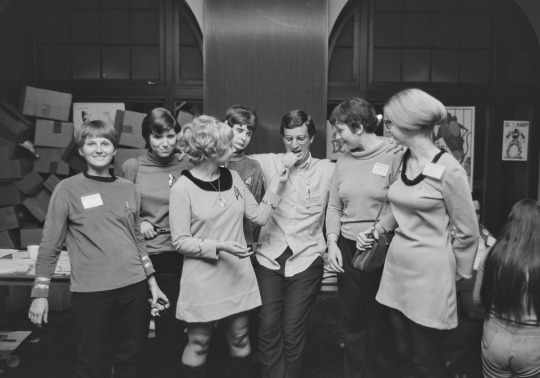
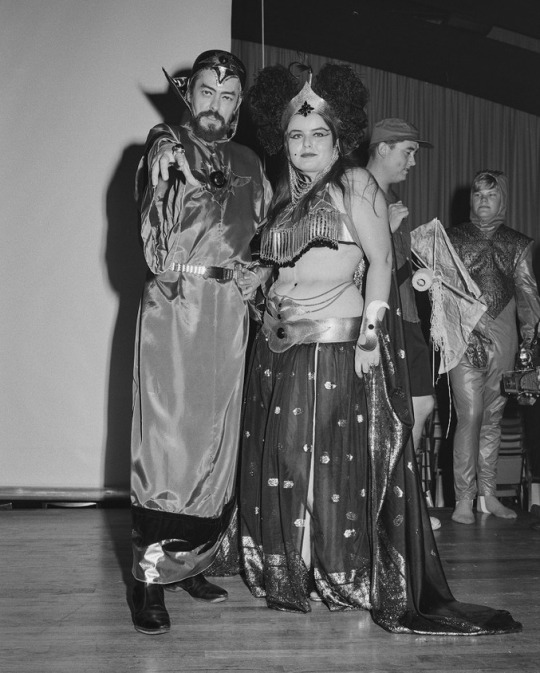
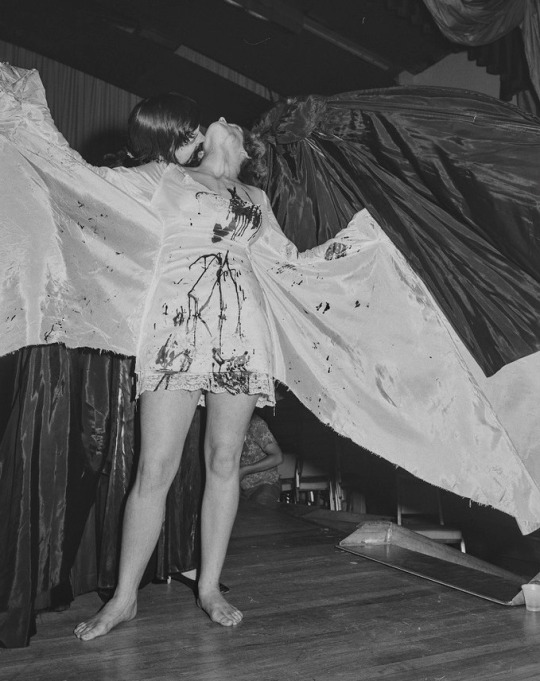
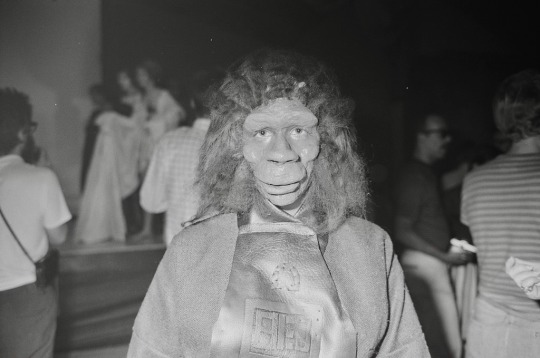
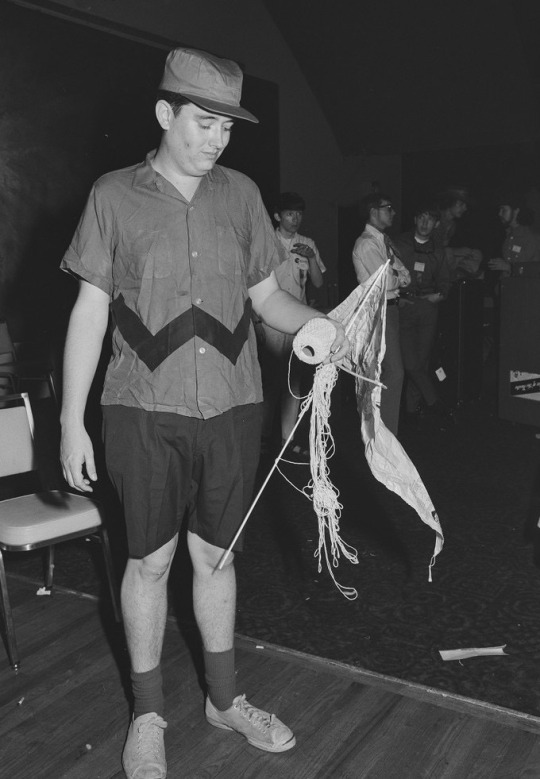
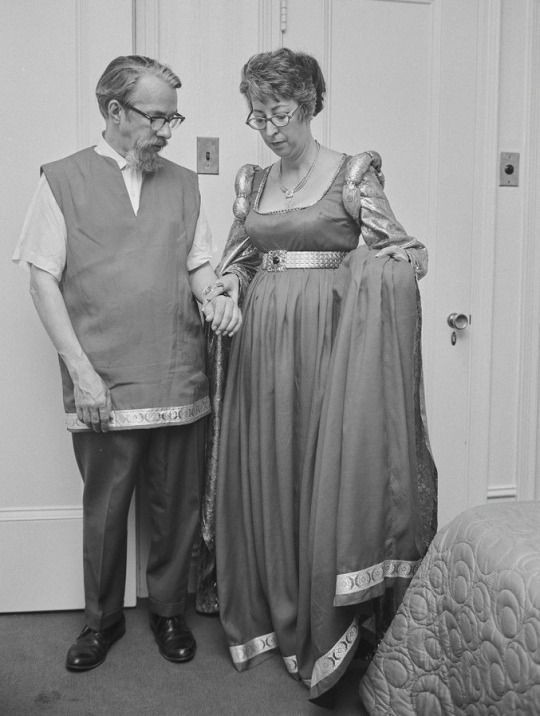
Cosplay at the World Science Fiction Convention in St. Louis, 1969. Photos by Jay Kay Klein.
#cosplay#worldcon#star trek#ming the merciless#flash gordon#charlie brown#lester del rey#planet of the apes
761 notes
·
View notes
Text
Developing Characters in Different Genres:
1. Understand the genre conventions: Familiarize yourself with the key characteristics and expectations of the genre you're working with. Each genre has its own tropes, themes, and narrative styles. Knowing these conventions will help you develop characters that fit within the genre while also providing opportunities for unique twists and originality.
2. Establish the world-building elements: In genres like fantasy, science fiction, or historical fiction, the setting plays a crucial role in shaping the characters. Develop the rules, limitations, and unique features of the world in which your characters exist. Consider how these elements influence their abilities, traits, and conflicts. Ensure that the characters are grounded in the genre's world-building, but also explore the human aspects that make them relatable.
3. Align character traits with genre elements: Integrate genre-specific traits, powers, or abilities into your characters' development. For example, in fantasy, characters may possess magical abilities or belong to distinct races with specific characteristics. In science fiction, characters might have advanced technology or genetic enhancements. Ensure that these genre-specific traits are relevant to the plot and contribute to the character's growth or conflicts.
4. Balance uniqueness and relatability: While genre-specific traits are important, it's crucial to balance them with relatable human qualities. Even in fantastical or futuristic settings, readers want characters they can empathize with. Give your characters relatable emotions, desires, flaws, and personal struggles. This balance between genre elements and relatable human characteristics will make your characters more engaging and memorable.
5. Create multidimensional characters: Regardless of the genre, multidimensional characters are essential for reader engagement. Provide your characters with a range of strengths, weaknesses, fears, and aspirations. Avoid one-dimensional heroes or villains. Characters with complex motivations and internal conflicts are more compelling, regardless of the genre they inhabit.
6. Consider the impact of genre on character arcs: The genre can influence the character's journey and growth. In mystery or thriller genres, for example, the protagonist may undergo a transformation as they uncover secrets or solve a puzzle. In fantasy, characters may embark on quests that test their bravery and lead to self-discovery. Tailor the character's arc to the genre, ensuring that it aligns with the story's themes and pacing.
7. Use genre-specific conflicts and challenges: Explore conflicts and challenges that are inherent to the genre. In mystery, characters may face life-or-death situations or navigate intricate plots. In historical fiction, characters might grapple with social or political upheaval. These genre-specific conflicts add depth and tension to the characters' journeys while immersing readers in the story's world.
8. Give characters agency: Regardless of the genre, characters should have agency and drive the plot forward. They should actively make choices and take actions that influence the course of events. Avoid making characters passive recipients of the plot or relying solely on external forces to drive their development. Active and motivated characters make for engaging reads across all genres.
9. Pay attention to dialogue and language: Language and dialogue can be shaped by the genre. In fantasy or historical fiction, characters may speak in a more formal or archaic manner. In science fiction, characters might use technical jargon or futuristic slang. Ensure that the language used by your characters is consistent with the genre while remaining accessible and understandable to readers.
10. Embrace genre-bending and subverting expectations: Don't be afraid to challenge genre conventions and subvert expectations. Introduce unexpected elements, twists, or characterizations that defy the norms of the genre. This can add freshness and originality to your characters and story, making them stand out from the crowd.
#writing#writer on tumblr#writerscommunity#writing tips#character development#writer tumblr#writblr#writing advice#oc character#writing help#oc development#fictional characters#creative writing#writers on tumblr
337 notes
·
View notes
Text
MY CHICON 8 SCHEDULE
MY CHICON 8 SCHEDULE
I’m thrilled to be going to Chicon 8 September 1 – 5, 2022!
The 80th World Science Fiction Convention
Hyatt Regency Chicago
151 E Wacker Drive
Chicago, Illinois 60601
Here is my schedule:
3-D Paper Craft, Friday, September 2, 2022, 10:45 AM CDT
Yoga and Juicing Isn’t Fixing This, Friday, September 2, 2022, 1:00 PM CDT
Teen Table Talk – A. L. Kaplan, Friday, September 2, 2022, 4:00 PM…

View On WordPress
#A. L. Kaplan#Amy Henrie Gillett#Anthony W. Eichenlaub#Author Appearance#Chicon 8#Claire Light#convention#D. H. Timpko#Emily C. Skaftun#Fantasy#Jadie Jang#Kelly Buehler#Maria Schrater#Mary Prince#Pat Virzi#reading#Science Fiction#World Science Fiction Convention#young adult
0 notes
Note
Hi. Can you share a cool fact about Israel? How's the fan culture over there? You guys got conventions? 👀
BOY DO WE
There are 4 big conventions in Israel, run by two organisations- the Israeli Society For Science Fiction and Fantasy(known shortly as "Ha'Aguda), and AMAI, the Israeli Manga and Anime Organization.
The Aguda's conventions are the biggest and most well-known. There's Icon during Sukkot and Olamot("worlds") during Passover, and both are always in Tel Aviv. Those are the comic-con of Israel- they have everything geeky and fanish, from every type of media. They last 2-3 days, and are free to enter but you have to pay to go into specific events. Those are my favorites!
AMAI's conventions are centered around Japanese media and culture. There are also two- Harucon at Purim(the closest con), and Animatsuri at the summer. Those cons costs money to enter, but once you're inside you can go anywhere as long as there are free seats. Those cons are in Jerusalem, and are very big. They also sometimes include a run of an Animusical(anime-inspired original musical production done by members of the community)
Other then those 4, we have lots of smaller cons done by different organizations and for different specific topics- there's Meorot which is a Harry Potter and LOTR con set during Hannukah, the Aguda also has Mitopia in the summer, that's centered specifically around books, and there's Draconicon for DND and RPG players! And a lot more! Last year I also had the chance to go to the first Sha'atnez, a con surrounding specifically Jewish Fantasy and Fantastic Judaism. It was fantastic and I REALLY hope it'll be an annual thing.
Interesting thing about fan culture here- the main two groups involved in it are queers, and religious orthodox jews. Both are in the fannish scene in much larger percantages then they make of the general population! I suspect the religious thing is because Shabbat-keepers have a lot of time when all they can do is read, and queers are already very dominant in such communities, but it's still very cool I think:)
Anyway fun fact, I've been in the artist alley for... 6-7 cons up untill now? My favorite to sell in was Noar Kore which sadly does not exist anymore but I REALLY like doing those booths.
#thank you for asking!#it was so fun to answer#israel#israeli culture#ישראבלר#israblr#fandom spaces#convention
164 notes
·
View notes
Text
The grayest characters in ASOIAF according to George R.R. Martin
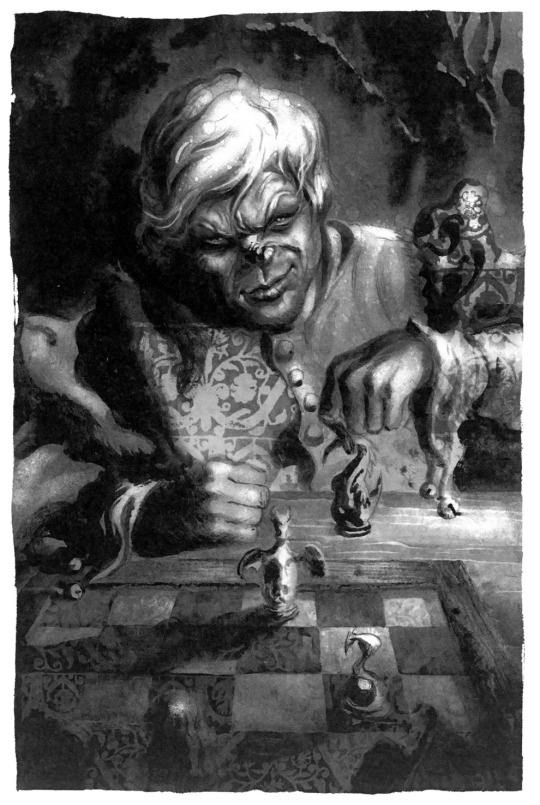

Tyrion is a very gray character. All my characters are gray to a greater or lesser extent, but Tyrion is perhaps the deepest shade of gray, with the black and white in him most thoroughly mixed, and I find that very appealing.
- George R.R. Martin, Science Fiction Weekly (2000)
Tyrion Lannister is my favourite. He is the grayest of the gray. In every conventional sense, he is on the wrong side but you have to agree with some of the things he is doing while loathing others.
- George R.R. Martin, SF Site (2000)
One of the things that distinguishes Game of Thrones, I think, and, of course, the books that I've written is gray characters. It's not a simple world of heroes and villains, characters have flaws, and I don't think any character in the whole opus is as gray as Theon Greyjoy.
- George R.R. Martin, Comic Con (2012)
347 notes
·
View notes